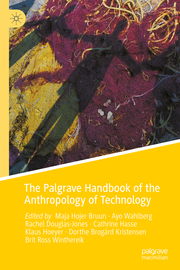Detailansicht
The Palgrave Handbook of the Anthropology of Technology
ISBN/EAN: 9789811670831
Umbreit-Nr.: 2856866
Sprache:
Englisch
Umfang: XXIV, 808 S., 7 s/w Illustr., 16 farbige Illustr.,
Format in cm:
Einband:
gebundenes Buch
Erschienen am 24.03.2022
Auflage: 1/2022
- Zusatztext
- This Handbook offers an overview of the thriving and diverse field of anthropological studies of technology. It features 39 original chapters, each reviewing the state of the art of current research and enlivening the field of study through ethnographic analysis of human-technology interfaces, forms of social organisation, technological practices and/or systems of belief and meaning in different parts of the world. The Handbook is organised around some of the most important characteristics of anthropological studies of technology today: the diverse knowledge practices that technologies involve and on which they depend; the communities, collectives, and categories that emerge around technologies; anthropology's contribution to proliferating debates on ethics, values, and morality in relation to technology; and infrastructures that highlight how all technologies are embedded in broader political economies and socio-historical processes that shape and often reinforce inequality and discrimination while also generating diversity. All chapters share a commitment to human experiences, embodiments, practices, and materialities in the daily lives of those people and institutions involved in the development, manufacturing, deployment, and/or use of particular technologies.Chapters 11 and 31 are available open access under a Creative Commons Attribution 4.0 International License via link.springer.com.
- Kurztext
- This Handbook offers an overview of the thriving and diverse field of anthropological studies of technology. It features 39 original chapters, each reviewing the state of the art of current research and enlivening the field of study through ethnographic analysis of human-technology interfaces, forms of social organisation, technological practices and/or systems of belief and meaning in different parts of the world. The Handbook is organised around some of the most important characteristics of anthropological studies of technology today: the diverse knowledge practices that technologies involve and on which they depend; the communities, collectives, and categories that emerge around technologies; anthropology's contribution to proliferating debates on ethics, values, and morality in relation to technology; and infrastructures that highlight how all technologies are embedded in broader political economies and socio-historical processes that shape and often reinforce inequality and discrimination while also generating diversity. All chapters share a commitment to human experiences, embodiments, practices, and materialities in the daily lives of those people and institutions involved in the development, manufacturing, deployment, and/or use of particular technologies.
- Autorenportrait
- Maja Hojer Bruun is Associate Professor at the Department of Educational Anthropology, Aarhus University. Ayo Wahlberg is Professor MSO at the Department of Anthropology, University of Copenhagen. Rachel Douglas-Jones is Associate Professor at the Department of BusinessIT, IT University of Copenhagen. Cathrine Hasse is Professor at the Department of Educational Anthropology, Aarhus University. Klaus Hoeyer is Professor at the Department of Public Health, University of Copenhagen. Dorthe Brogård Kristensen is Associate Professor at the Department of Business and Management, University of Southern Denmark. Brit Ross Winthereik is Professor at the Department of BusinessIT, IT University of Copenhagen.
